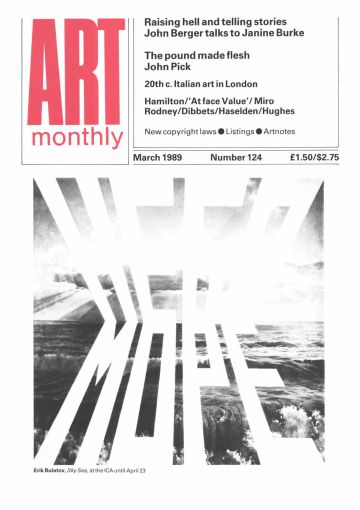Interview
Raising Hell and Telling Stories
John Berger talks to Janine Burke
Janine Burke: The revolutionary quality of your work consists in the demands it makes on the reader to rethink systems previously accepted. To read your work is constantly to be challenged. This is obviously a life process for you and a way of thinking about the world. What is there in your background that challenged you sufficiently to put that process into effect through words and images?
John Berger: I have two clues about it. One is to do with my very early childhood. Although I lived with my mother and my father, my childhood was rather like that of an orphan. I was alone from a very early age. I had to find out everything for myself. One of the things I lacked was a strong sense of identity which comes principally from the love of one’s parents, I mean, the expressed love. It was there but I didn’t really experience it. It meant I could identify easily with other people, I could lend myself to them. I felt that I never belonged to one place or one milieu. The second thing is simpler to explain. From a quite early age, from six till sixteen, I was sent to those totally barbaric English private schools. I wasn’t victimised but they were crazy places, mad and vicious. At sixteen, I ran away. If you take what now obsesses the English, their upper-class spies, all of them went to somewhat similar schools. It’s because of the system they found themselves in they became Soviet spies. Well, I didn’t become a Soviet spy, I was a bit younger but I decided that I wanted to get the bloody hell out of that country and never have much to do with it again. Above all, with its ruling class. Because that’s what we’re talking about, the ruling class.
Burke: A Painter of Our Time was your first novel. You’d trained as a painter, you were already writing art criticism. How did that novel come to be? Was it through the practice of writing criticism or was it due to the abandonment of painting, the act of painting itself?
Berger: That book was a kind of farewell to painting. The reason I decided to abandon it wasn’t because I didn’t like it. Even now there is nothing that gives me more satisfaction than drawing or painting. Nor was it because I thought I lacked talent. But in the late Forties with the issues of war and peace and the threat of nuclear war, particularly before the Soviet Union acquired nuclear parity, it seemed to many of us that the world had only a few years to survive and so the urgency of political statements, political action and propaganda was enormous. Painting seemed a very indirect way of contributing to that whereas words seemed not all that effective but rather more so. This, I rationalised to myself, was why I gave up painting. I threw myself into journalism about art but also about political issues, into political activity, into meetings. Then, as time went on, I became so engaged that the return to painting, although remaining a dream which I still have, became impossible.
Burke: So it didn’t hurt?
Berger: No, it didn’t hurt.
Burke: You certainly raised hell as ayoung art critic.
Berger: Well, it wasn’t difficult to raise hell in that polite world.
Burke: In Painter of Our Time you presented Janos, the central character, with a moral dilemma. And you placed him in a milieu, gave him friends which are not usual, not the stereotype of the artist’s life.
Berger: It so happened that more than half of the artists I knew, mostly older than myself, were refugees from fascism. Jewish, but not all. People who had left Nazi Germany, Austria, Poland and come to England just before the war. I lived in a circle of refugees and there was a kind of complicity and understanding between us, despite our different experiences. These people had survived because of England, and England, compared to what they’d left, was democracy, freedom. But there was something that distanced them from the English and made them feel foreign. I knew what it was. The English refusal to recognise pain. For the refugees, pain was inevitable, even a spur to creativity. It was what we had in common. Out of that experience came the character of Janos.
Burke: So from a very early age you decided to reject England?
Berger: It wasn’t only a rejection of England, it was a desire or ambition to become a European. Only now, in terms of my existence as a writer, is this true. I’ve become a European. I chose France because the men I most admired – Camus, Barthes, Merleau-Ponty, not to mention artists like Giacometti – were here. Yet I think that my adopted country, though it had become France, was Europe and I mean both eastern and western Europe.
Burke: That’s a big home. It means your life and your writing needs to be complex enough to address a range of different issues, particular to those places.
Berger: Becoming a European didn’t necessarily mean I had insightful things to say about all those places but it meant I could cut through the local prejudices of countries, of classes, to reveal elements which are quite simple, and not so diverse, but which so much official culture buries.
Burke: In 1972, you won the Booker Prize for G. You gave part of the money to the London Black Panthers and criticised Booker-McConnell for its financial interests in the Caribbean. How was that received by the London literary world?
There was a ceremony at the Café Royal in London where several hundred members of the literary world gathered. I got up and made my speech, and when I was about halfway through, and it was clear what tack I was going to take, many of the guests picked up their spoons and began to hit them against their glasses, saying, ‘Sit down, shut up, you bugger.’ Exactly like schoolboys and schoolgirls. So I had to wait several minutes even to be heard. Then somebody, some liberal, said, ‘Let him have his word.’ They were quiet for a while, then at the end they did the same. It was remarkably infantile.
Apart from the Booker, G also won three other prizes. In a sense, those prizes were decided by the literary establishment so I can’t really say that I was considered Enemy Number One. The reaction was profoundly English – which was to forget it. ‘We will pretend to forget it though we will never forget it.’
Burke: Like a faux-pas?
Berger: Exactly.
Burke: G is an anti-hero, isn’t he? A transparent character who is acted upon by circumstance. Events drain through him, and he’s formed by them rather than having an inner life. Women are the formative agents. G remains a mystery.
Berger: It’s not that he’s an anti-hero, it’s rather that he’s a myth. The essential quality of a myth is that it has an outward action but no personalised centre. That’s why he doesn’t have a name. The idea of writing a book about Don Juan came to me when I was writing the book on Picasso because it seemed to me that he was a kind of Don Juan of painting.
Burke: Picasso is a very physical text, as though you’re tackling him, wrestling with him. You’re as keen to represent the mythology of the Picasso persona as you are to discuss the paintings. It seems logical that you could draw out of this the possibility of a fictional work.
Berger: I asked myself, when was the last time one could have a Don Juan as opposed to a Casanova character in European history! There are two preconditions. One is a society that is stagnant, that is not politically or socially mobile. When you have a dynamic society, the energy of a Don Juan would be directed in a different way. He’d fight society, challenge it. He might be a fantastic chaser of skirts but it wouldn’t be his principle role. Secondly, he would need a society where women are the property of men. The last period when those two conditions applied was just before the First World War. In Britain today, they could apply, at least in some milieus, despite the feminist movement.
Burke: Does writing come fluently to you? There is a marvellous luminosity to your words, a distillation, an honesty so profound it is almost abstract.
Berger: I actually have rather little talent for writing. I have much more talent for drawing, for example. Maybe I have a talent for vision but not for putting it down. Therefore when I write never, to begin with, does it come out any sort of way that I want. I write the same pages six, seven, eight times. That means for every book, I write six or seven. That’s why they take so long. Writing and rewriting, so the words come as close as I can get to the original vision or melody. Perhaps a distillation occurs.
Burke: Both the reading of your work and the sense of how you’ve created it are very physical sensations. That’s one of the most affesting qualities of your writing, particularly when you talk about painting. It’s literally arresting, it gives the reader pause.
Berger: It’s true that I’m so physically concentrated that I can’t get out of a chair afterwards, I’ve got cramps in both legs. It’s also true that I say the words to myself, out loud. Both of those things are very physical. Perhaps it comes from this lack of facility, this lack of talent in the usual sense of the world. Most creative achievements are like that: they begin with a difficulty.
Burke: Was Ways of Seeing made to challenge Kenneth Clark’s Civilization?
Berger: Mike Dibb, the director, suggested he and I work together and we decided to do several programmes on art. Soon after, Kenneth Clark’s series went to air and we thought we were doing the opposite of that, a kind of reply. The BBC didn’t believe in our series at all. They gave us a very small budget, they didn’t even give us a studio to work in. They gave us a Nissen hut in the suburbs of London which had no sound-proofing. It was so close to a main road that every time a lorry went past we had to stop and re-take. Then they forgot about us, which was a stroke of incredible luck because we did as we liked. We worked on those programmes for nine months, so we had time to perfect them. When we showed the four programmes to the BBC, they didn’t like them at all. So they were shown very late at night but finally, after much discussion, they were re-scheduled and became successful.
Burke: The most influential part of that series, and the book, was the critique of women’s imagery. It came at a moment in the early Seventies when the analysis of women’s imagery in art and advertising had just begun. Was this section of Ways of Seeing the result of a collective process or your own observations coalesced over a long period of time?
Berger: Many of the ideas came from G. There are some sentences that are almost the same. But the ideas generated by the women’s movement were discussed and, undoubtedly, we owed a great deal to that. There are a group of women who are interviewed at the end of the programme: they viewed the series before it was finished and gave us advice, too. Completely unexpectedly to us, the book and the series became well-known, influential. Now there’s a danger, I feel, that Ways ofSeeing has become a kind of holy writ which is the exact opposite of what we were trying to do. We wanted to open up the questions that others would take further. And the feminists have taken it further. We were simply catalysts.
Burke: In About Looking you mention Roland Barthes’ followers who ‘love closed systems’. What are your thoughts on the post-structuralist enterprise? Do you see it as a post-’68 turning away from radical action?
Berger: For Barthes I have enormous admiration. I’ve learnt a great deal from him. My feeling for him has nothing to do with structuralism, it is actually to do with the pain that is in him. This is so well described in Camera Lucida. To me, post-structuralism represents two things. One is an acceptance of political closures. Those political closures were there, I don’t think the writers made them up out of cowardice though the movement has its academics. Academia always makes its cosy corners. Secondly, it drew attention to a consciousness of the text as artifact. That is quite important because it comes back to an awareness of what story-telling is, an awareness that stories are different from life, and they join life, not simply because they are parallel to life but because they have a certain autonomy whilst touching life all the time. So on the one hand there is the political quietism but on the other it draws attention to what had been forgotten, a notion of engagement it was necessary to re-find.
Burke: Geoff Dyer’s Ways of Telling, which deals with the body of your work, does you a great disservice. Will you rectify this balance by writing your autobiography for us?
Berger: From time to time, I write tiny bits of text that are autobiographical but I can’t imagine that I would write an autobiography. The reason for that is linked to the first thing I said: I have such a weak sense of my own identity except when I’m working on something and, of course, that means something other than myself.
Burke: But that’s the gift of the story-teller, isn’t it?
Berger: Maybe the story-teller can never write an autobiography, maybe that’s the contradiction. It’s been proposed to me, for instance, to write about my experiences in those private schools. But then I think about what’s happening in South Africa and I think, who cares what’s happening in those schools? It’s so small compared to the important things. I can’t give my energy to it.
First published in Art Monthly 124: March 1989.










